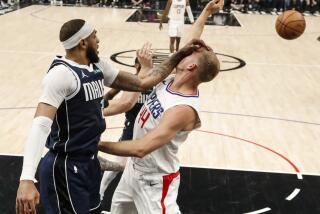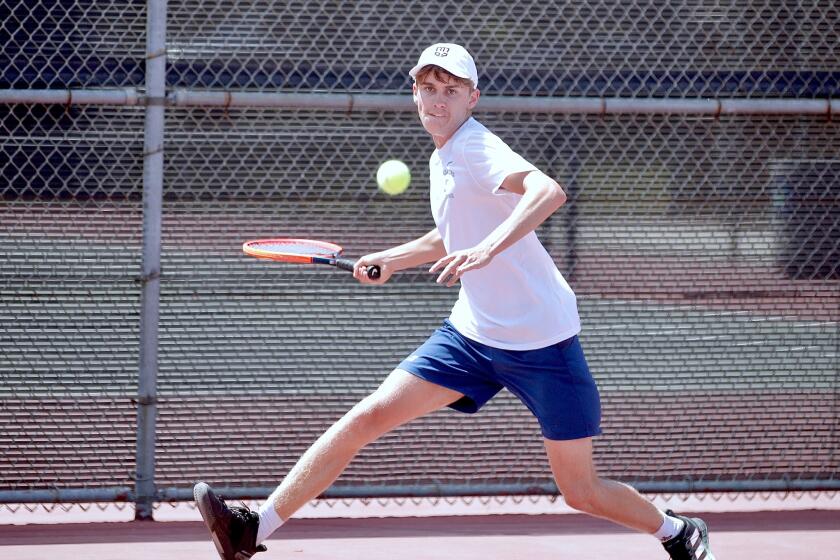Trying Times
This should be one of the best years in Curt Schilling’s life. The Arizona Diamondback right-hander is off to one of the best starts of his career, and he takes the mound tonight as the starting pitcher for the National League in the All-Star game at Seattle.
Instead, this is the year his wife, Shonda, is battling a rare thyroid disease and a potentially deadly form of skin cancer. Instead, this is the year a close family friend chose to die rather than continue her fight against Lou Gehrig’s disease--an affliction that the Schillings are so involved in fighting that they named their youngest son in honor of the former New York Yankee great.
Instead, this is the year a man Schilling considers a brother draws closer to death due to his own battle with the illness.
Instead, for Curt Schilling, this is the year that baseball became an afterthought.
The Schillings thought they had put hospitals and doctors behind them. While pregnant with their youngest child, Shonda developed a painful and potentially life-threatening blood clot in her left leg, but delivery went smoothly.
Then, in February, the 33-year-old known for her high-energy attitude and meticulously organized lifestyle suddenly couldn’t remember the directions to the grocery store. She fell asleep from exhaustion in the middle of the day.
“I couldn’t function,” she said in a recent interview.
She was diagnosed with an underactive thyroid that slowed her metabolism but can be treated with medication.
And doctors found something else. They discovered a mole on her back that was cancerous. Left untreated, it could spread.
She underwent surgery in May to remove 25 potentially malignant moles, a procedure that left 25 two-inch scars.
In June, she had her fourth operation to diagnose eight more suspicious moles.
Her parents, Patsy and Donald, were there to help take care of the couple’s children--Gehrig, 6; Gabriella, 4; and Grant, 21 months.
But Curt Schilling, 34, woke up at 4 a.m. each day during spring training, kissed his wife and three children goodbye and made the two-hour commute from Phoenix to the Diamondbacks’ training facility in Tucson.
“I felt I should be there during the hardest time,” he said during a separate interview. “There were all sorts of questions we had, and I wanted us to be together, She’s my best friend. She’s always been there for me to lean on and I wanted to be there for her.”
Shonda at first misinterpreted her husband’s decision to commute to spring training after the diagnosis.
“He scared me,” she said. “I was wondering why he was staying. He’s so smart and he read up on all this stuff. . . . I was asking Curt, ‘Am I going to die?’ ”
She also knew he was frightened, even though he wouldn’t admit it.
“It’s my job to take care of my family,” he said. “What kind of message would I send to her or my children if I was an emotional wreck?”
He already had lost a best friend to cancer when he was 21. During spring training in 1988, Schilling’s father, Cliff, 55, was battling a brain tumor when he suffered a fatal aortic aneurysm.
Eight months later, Schilling made it to the big leagues with the Baltimore Orioles.
The death had a profound effect on him: “I felt like I lost my whole family.”
He and Shonda met in Baltimore two years later, and they were a couple when he moved on to the Houston Astros in 1991. She didn’t sense how deep a void his father had left until he struggled as a closer and was demoted to triple-A Tucson.
“It was the first time he ever failed at something and he didn’t have anyone to talk to,” she said.
The couple grew closer during this time, but their love couldn’t replace the loss of his father.
In 1992, the Astros traded Schilling to the Philadelphia Phillies, with whom he finally became a solid starter. He and Shonda married and started a family.
“He finally matured and realized he wanted to have a family again, and be the kind of dad his father was,” Shonda said.
That reflection about life’s frailty explains why the Schillings became involved with the fight against ALS, amyotrophic lateral sclerosis, after attending a Phillie charity event.
Though no member of their family has had ALS, the Schillings’ commitment is strong. Since 1992, the couple has raised more than $2.5 million to raise awareness and find a cure.
And when Shonda gave birth to their first child in May 1995, the Schillings named him Gehrig, as a tribute to every ALS patient they’ve met.
One of those patients is Dick Bergeron, a fortysomething businessman.
Lately, Bergeron has not felt well.
Bergeron used to come to Veterans Stadium to watch Schilling play during the pitcher’s 8 1/2 seasons with the Phillies.
But severe bronchitis and the progression of the paralyzing disease makes travel impossible. He faithfully e-mails Schilling the night before each start and wishes the pitcher good luck.
He once told Schilling that their friendship keeps him going.
“That means everything to me,” Schilling said.
Not everyone, of course, gives as much time or support to a cause as the Schillings.
“We said at the beginning we weren’t just going to lend our names,” Schilling said. “We’re going to do this as long as we need to to wipe out the disease.”
The disease destroys the nerves that control muscles, and usually causes death from respiratory distress--unless the patient goes on a ventilator.
Many ALS patients remove the ventilators rather than live a life sustained by machines.
The Schillings met journalist Dale O’Reilley five years ago while working with ALS patients in Philadelphia. Shonda kept in close touch with O’Reilley when Schilling was traded last year from the Phillies to the Diamondbacks. On June 12, at O’Reilley’s request, her doctor removed the ventilator that had kept her alive for eight years.
She had e-mailed Shonda and told her of her decision to end her life at 54. Shonda struggled trying to write back her farewell thoughts to the woman who had helped her through her own health problems, trying to put into words how much their friendship had meant.
“She was always so upbeat and she made it easy for me to talk about my fears of death,” Shonda said.
The relationships built with Bergeron, O’Reilley and others have helped the Schillings keep their own troubles in perspective.
“There’s an air of peace in this house,” Shonda said. “After a bad game Curt will tell me, ‘How can I be upset at baseball?’
“There’s no way that I could feel sorry for myself after seeing what they go through,” she said of those afflicted with ALS. “I know sometimes people might say ‘Oh, you poor thing, how hard can your life be, you’re married to a rich athlete,’ but we were never the type of people that thought money brought happiness. Our work helping these people showed us what mattered in life.”
Today, Shonda’s prospects for recovery are good.
During her last doctor visit, two lumps were found in her breast and three in her groin. Fortunately, they are not cancerous, but doctors will closely monitor her progress to make sure the cancerous cells have not spread.
In April, she hosted two charity fund-raisers and recently went to Washington to build awareness of ALS. It’s something she has done for 10 years.
Along the way, she and her husband have earned the admiration of others.
“It is very difficult to become emotionally invested in people’s lives, become their friends, to know and love their spouses and children, when those friends continually die from a disease whose cure, even an effective therapy, remains a mystery,” Mark Reiman, who has been living with the disease for 10 years, wrote last month in a magazine tribute to the Schillings.
Somehow over the last year, Schilling has been able to concentrate on baseball.
“You try to do what you have to do mentally to try to keep the two--my life and my job--separated,” he said.
Schilling is sixth in the National League with a 3.20 earned-run average and leads the National League with 12 victories.
His right shoulder is finally at full strength after undergoing surgery in December 1999. Schilling signed a three-year, $32-million contract extension with the Diamondbacks during the off-season. And he’s pitching for a championship contender in the town where he was raised.
“In my mind, he’s throwing the ball right now about as well as I’ve seen him throw,” Dodger Manager Jim Tracy said after a loss to Schilling last month at Phoenix.
Schilling said he sometimes draws strength from Lou Gehrig, who showed remarkable courage when his 16-year baseball career was tragically cut short in 1939 when he was diagnosed with ALS. Last month marked the 60th anniversary of Gehrig’s death at age 37, nearly two years to the day after his last major league game.
“He was a true gentleman,” Schilling said. “You could hear the reverence in his voice . . . and to go through what he went through is stunning.”
You get the sense that somewhere that gentleman may be tipping his hat to another gentleman for more than a great season.
More to Read
Get our high school sports newsletter
Prep Rally is devoted to the SoCal high school sports experience, bringing you scores, stories and a behind-the-scenes look at what makes prep sports so popular.
You may occasionally receive promotional content from the Los Angeles Times.






